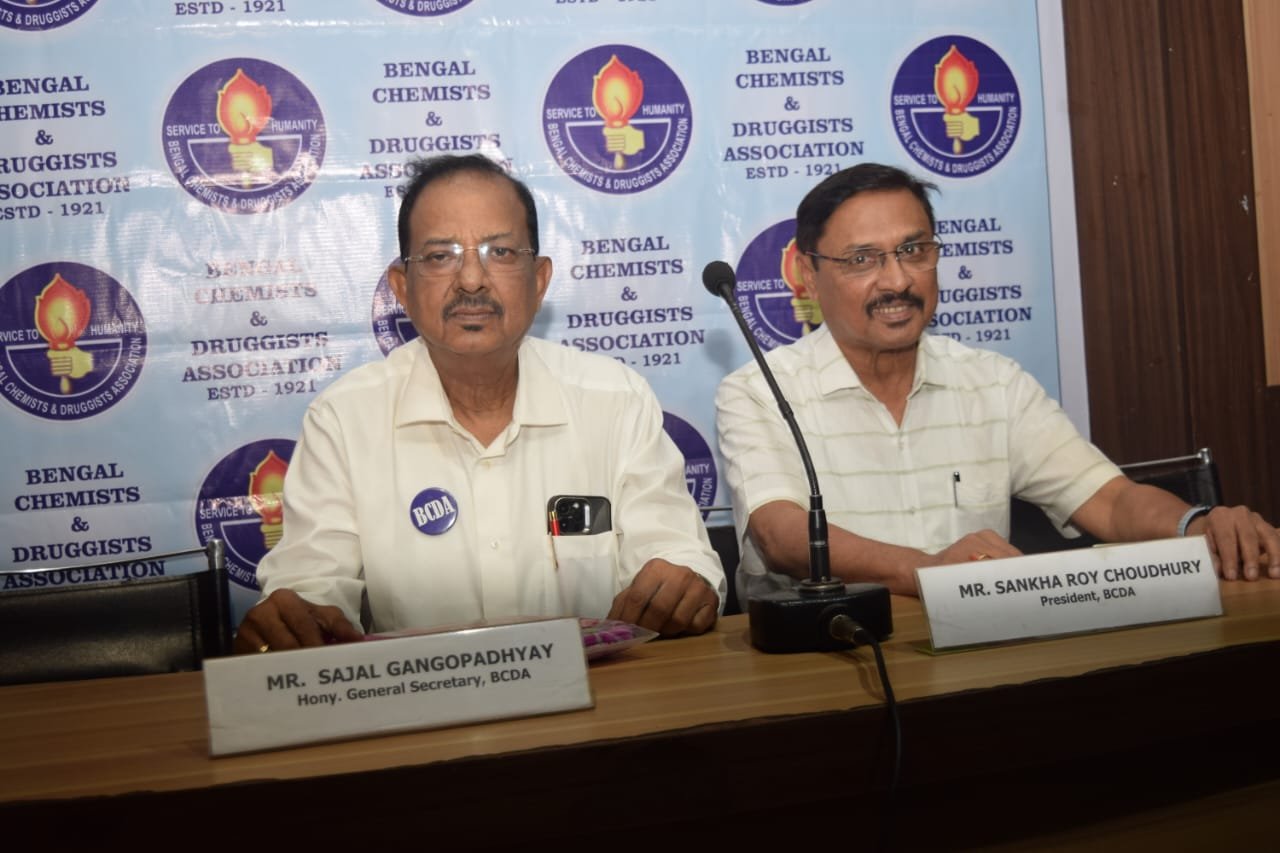Kolkata : Bengal Chemists and Druggists Association (BCDA), under the All India Organization of Chemists & Druggists (AIOCD) a leading association of pharmacists in India, has vehemently opposed a proposal by the Central Government to allow the sale of Over the Counter drugs (OTC drugs) in general stores and grocery stores in a press conference organized by BCDA in Kolkata. Sankha Roy Chowdhury, Honorary President, Bengal Chemists & Druggists Association, Sajal Gangopadhyay, General Secretary, Bengal Chemists & Druggists Association and other members of BCDA were present at the occasion.

Sankha Roy Chowdhury, President Bengal Chemists & Druggists Association said- ‘that the Government’s proposal to sale of OTC drugs- approximately 400 in general stores and grocery stores including antibiotics, other habit forming drugs, nasal spray and others will pose significant public health risks due to the lack of pharmacist oversight and potential for misuse of drugs.’ He also added- ‘that such a move would flout the existing drug and cosmetics laws of India, pharmacy regulations and
pertinent legal charters including directives from the supreme court.’

BCDA has emphasized that India’s existing network of nearly 12.40 lakh retail chemists and 13.5 lakh pharmacists is sufficient to meet the population’s needs for OTC drugs. The association urges the government to consider these concerns and involve all stakeholders in discussions before implementing any policy changes regarding OTC drug sales.
The government has proposed a draft to bring OTC medicines into India through an amendment to the Schedule K of Drugs and Cosmetics Act and permit their sales in general and grocery stores without the need for a prescription. The government has identified approximately 400 compositions including antibiotics, nasal spray and others to bring under this category. At present approximately 16 drugs under Schedule K are available over the counter.

Sajal Gangopadhyay, General Secretary, Bengal Chemists & Druggists Association said- ‘the government’s proposal would be dangerous for the chemists, the doctors and the society as a whole. Allowing OTC drug sales without proper regulation poses serious threats, including drug abuse, increased risk of self-medication, delayed access to healthcare, possible compromise in storage of medicines etc.’
He also added that ‘Pharmacists play a crucial role in educating patients about drug usage, dosage, and
potential side effects of every drugs. The absence of pharmacist could lead to adverse drug reaction which in turn can lead to serious medical crises to general public. Government has no infrastructure to test the spurious drugs considering government has just one laboratory to cater to the entire market. With government having no control the supply of spurious drugs will increase and will pose a serious threat to the lives of millions of people.’
In its appeal to the government Bengal Chemists & Druggists Association (BCDA) the association of pharmacists in India under the All India Organization of Chemists & Druggists (AIOCD) has raised concerns on the following grounds-
Violation of Existing Laws: BCDA highlights that selling any drug, including OTC drug through unlicensed stores would violate the Drugs and Cosmetics Act, Pharmacy Act, and Pharmacy Practice Regulations. These regulations mandate the involvement of registered pharmacists to ensure the safe and proper dispensing of drugs.
Lack of Pharmacist Consultation: Pharmacists play a crucial role in educating patients about drug usage, dosage, and potential side effects. Without pharmacist guidance, individuals risk self-medicating incorrectly, leading to adverse reactions, missed diagnoses, or ineffective treatment.
Increased Risk of Self-Medication and Drug Abuse: Easy access to OTC drug in grocery stores could encourage self-diagnosis and misuse of medications, potentially leading to dependence and addiction.
Proliferation of Spurious Drugs: The lack of regulatory control in general stores could create opportunities for the sale of counterfeit or substandard drugs, jeopardizing public health.
Improper Storage and Expired Drugs: Grocery stores may not have the necessary infrastructure or expertise to ensure proper storage conditions for drugs, potentially compromising their effectiveness and safety.
Delayed Access to Healthcare: Reliance on OTC drug for minor ailments might delay individuals from seeking professional medical attention for potentially serious conditions.
Weakened Pharmacovigilance: Grocery stores may lack the systems for reporting adverse drug reactions, hindering efforts to monitor drug safety. Bengal Chemists & Druggists Association (BCDA) has opposed the proposal and raised concern on the state government’s decision to constitute a district level surveillance team with District Magistrate being the Chairman.
BCDA has cited the newly constituted team lacks the technical knowledge, requisite skill, efficient manpower and state of the art infrastructure for proper surveillance at district level. The government lacks quality infrastructure to test spurious drugs as they have one centrally accredited laboratory to cater to the entire West Bengal market.
Suggestions from Bengal Chemists & Druggists Associations on the District Task force for Drug Surveillance: In light of the recent formation of the District Task Force aimed at strengthening surveillance against spurious or expired drugs, over-the-counter sales of antibiotics, and habit-forming drugs without prescriptions, as well as monitoring drug prices, the Bengal Chemists & Druggists Association (BCDA) wishes to present our views and recommendations:
Spurious and Counterfeit Drugs: The issue of counterfeit drugs is critical, both public health and the reputation of the country’s pharmaceutical trade. Prompt and priority action is essential. Typically, actions are initiated based on Government analysts’ reports declaring drug samples as substandard. These spurious drugs are often produced by unlicensed individuals, though licensed manufacturers can also be involved. Drug Inspectors collect samples to ensure drug quality.
Antibiotics and AMR: Antibiotics are vital in combating infectious diseases and enhancing public health. However, overuse, misuse, over-the-counter sales, and unnecessary prescriptions are leading to antibiotic resistance (AMR), a serious public health threat. The misuse of habit-forming drugs also poses significant
societal risks.
Price Monitoring: Price Monitoring and Resource Units (PMRUs) at the district level are established to ensure drug affordability and security.
The state’s weak regulatory infrastructure, insufficient testing facilities, lack of a whistle-blower scheme, low awareness, and absence of special courts are significant barriers to effective action against spurious drugs.
As a responsible trade organization, BCDA regularly issues guidelines and conducts technical seminars for shop owners, urging them to avoid selling antibiotics without valid prescriptions, source their products from reputed vendors and to adhere strictly to the Drugs & Cosmetics Rules. However, we are concerned about surveillance by non-drug control officials, which often leads to unnecessary harassment and irrelevant documentation, causing fear among shop owners:
Suggestions:
- Upgrade Regulatory Infrastructure: Enhance State Regulatory framework
- Enforce quick action: Improve coordination with other enforcement agencies for swift action against offenders
- Enhance Testing facilities: upgrade drug testing facilities and ensure adequate staffing
- Establish Special Courts: Set up special courts for speedy trials of drug related offences
- Implement Whistle blower scheme: Introduce Whistle blower scheme to encourage reporting of spurious drug activities
- Increase Awareness Program: Conduct more program to raise awareness about drug safety
- Technical Surveillance: Ensure that only qualified technical personnel conduct surveillance activities
The task force formed by the government is a positive step towards curbing the menace of spurious drugs and developing effective policy measures. According to a recent Supreme Court judgment, only Inspectors of Drugs have the authority to conduct inspections, investigations, searches, and seizures related to drug offences. Police and other officials are not empowered to perform these duties under the Drugs and Cosmetics Act. We trust that these suggestions will be considered to enhance the effectiveness of the task force and improve drug safety for all.



